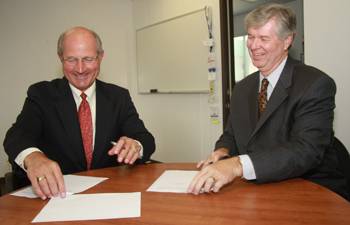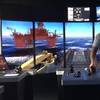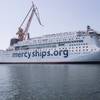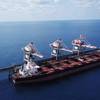Cal Maritime and Clearwater Port Partner
The California Maritime Academy of Vallejo, CA, a member of the , and Clearwater Port LLC, announced the creation of a joint program to expand West Coast training in the handling and transport of liquefied natural gas (LNG) products. The program puts in place the first formal continuing education LNG training available from a nationally recognized institution on the West Coast. Cal Maritime is one of seven maritime academies nationwide and the only one on the West Coast.
is proposing the conversion of an operating offshore oil platform, located 12.6 miles off the coast of , CA, into a state-of-the-art LNG re-gasification terminal to meet ’s need for affordable, reliable clean-burning natural gas. officials said the decision to help underwrite continuing education of personnel working in the field reflects its commitment to sustaining the industry’s outstanding safety record for the transport, handling and distribution of this vital commodity.
The new program, to be developed and implemented by Cal Maritime's Office of Special Projects and Extended Learning, will include the development of curricula and the delivery of LNG training and continuing education services for personnel working in the fields of maritime and shore-side transportation and handling of LNG products. Initial program funding for course development is being provided by
Under the agreement, Cal Maritime will develop the curriculum and implement a 2-3 day entry-level (Level I) introductory course for “new hires” not directly involved in the ship/shore interface. It will cover such areas as the science of LNG, ship and terminal operations, the LNG marketplace and safety. Those taking this initial course will have had minimal exposure to LNG shipping and handling.
Secondly, the University will develop and implement a more advanced five-day course (Level II) – having a much greater operational focus. It will cover the science of LNG in greater detail, including chemical composition, liquefaction, re-gasification, and cryogenic properties. It will also address vessel design parameters and construction; operations -- including inerting, gassing, cooling, loading, discharging, warming, re-inerting and gas-freeing of LNG carriers; international rules and regulations; firefighting and prevention; and safety and personal protection. The Level II advanced course may also include simulation training in Cal Maritime's Transas Liquid Cargo Handling Simulator. The course will be immediately beneficial in providing key personnel with a detailed understanding of LNG vessel and handling operations.











